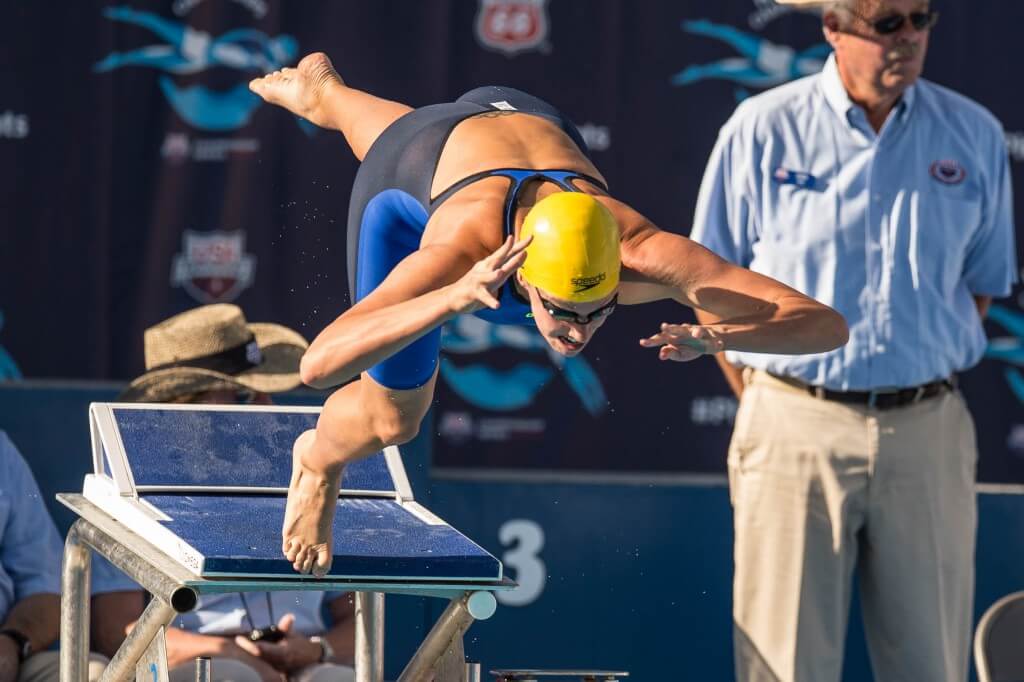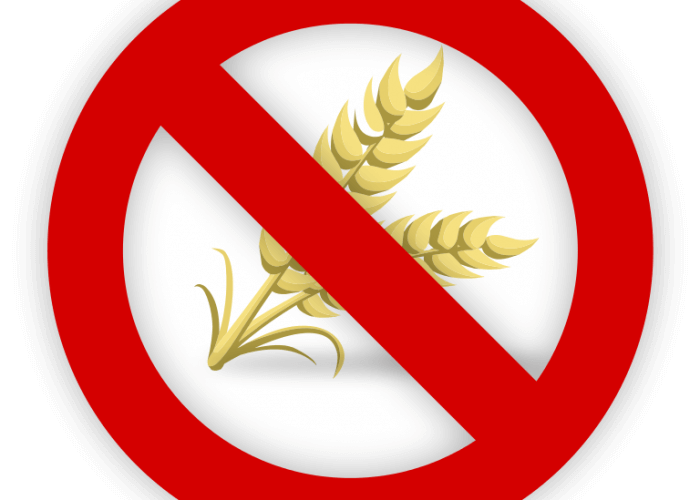Should Swimmers Go Gluten Free?

By Chris Balbo, Swimming World College Intern.
In an endurance sport like swimming it can be argued there are finite ways in the pool to get faster. Every second, tenth and hundredth matter, but the pool is not the only place swimmers compete. Athletes and swimmers now focus on competing outside of the pool– for instance, in the kitchen. Competing in the kitchen requires adequate food or fuel for performance and recovery.
Some fad diets such as “going gluten free” became popular in America but is not necessarily “better” than diets containing gluten. More recent questions have been proposed whether the gluten free diet should be recommended for endurance athletes. Swimmers are endurance athletes, so should swimmers go gluten free?
What is Gluten?

Photo Courtesy: Linda Nylind
Gluten is a protein found in wheat, rye, barley (malt), and can be found in processed oats. The gluten free diet therefore entails the elimination of gluten from the diet including traditional bread, pastas, and baked goods. Those following a gluten free diet eat grains such as rice, corn, potatoes, and quinoa for carbohydrates as opposed to wheat. Gluten free products are usually higher in calories, fat, and sodium opposed to their gluten containing counterparts.
Gluten Free Diet Recommendations

Photo Courtesy: Wikipedia Commons
The gluten free diet entails the elimination of gluten from the diet. Gluten free diets are usually only recommended to the one percent of the population with celiac disease. Celiac disease is a genetic autoimmune disease that affects the digestion and processing of the gluten proteins in the small intestines. If an individual with celiac disease eats gluten the immune cells attack the lining of the small intestines. Along with the population with celiac disease, an increasing number of people have been found to have gluten sensitivity or gluten intolerance. Those who are gluten intolerant or sensitive may experience gastrointestinal discomfort. These individuals should follow a gluten free diet. The real question is should athletes go gluten free for extra health benefits? The answer is simply “no”.
Gluten and Athletic Performance
A US National Library of Medicine study done with non-celiac athletes concluded that there were no benefits in athletic performance, gastro-intestinal symptoms, or well-being by following a gluten free diet compared with a gluten containing diet.Therefore, the gluten free diet does not benefit anyone other than those with dietary gluten issues. Although this study was completed for a short period of time (a matter of weeks), it is not necessarily the secret to swimming faster.
Swimmers like Dana Vollmer have turned to the gluten free diet, but Vollmer is known to suffer from gluten intolerance as well as other allergies. Vollmer’s improved speed could have been attributed to her dietary change because her gastrointestinal tract was possibly no longer attacking itself, allowing for her intestines to heal. All in all, competing in the kitchen can be critical to augmenting swimming performance, but the gluten free diet is not the answer for everyone.




Not unless they have celiac or a gluten intolerance/sensitivity/allergy. Gluten free and healthy living aren’t the same thing.
Boo don’t be lazy
How is that lazy?
No one should
They should go chlorine free to preserve their skin and lungs.
Uneducated response
Staci Freeworth
Lololol. I’m triggered. Kyle Griggs
Nicole Baney
The article should have said that “gluten-free versions of products that typically contain gluten can be higher in fat, calories, sodium, etc.” Naturally-occurring gluten free foods are not. And that said, unless an athlete has trouble with gluten and feels better by avoiding it, then its not a good idea to give it up. It’s very challenging to get enough calories and “good carbs” as a swimmer on a gluten-free diet.
No it’s not, fat contains way not calories than carbs
Fats are more anti-inflamatory than carbs
Just a trend
Uneducated response
You’re funny!
Kelly Howell unless you have Celiacs and/or gluten sensitivity, she’s absolutely correct
Organic
Having a family member with Celiac, and watching what she has to do to stay healthy, I don’t understand why someone would want to do this unless it made them feel better. There are people that are gluten sensitive, which is different. Beware of all the processed gluten free food out there.
Not healthy unless necessary
Gluten blocks nutrient absorption
Kelly Howell yes!
Kelly Howell source?
Kelly Howell the information you are spreading throughout this comment thread is false. Gluten do not block nutrient absorption *in not celiac case*. I have celiac as well as studied nutrition and the info you have in your head is absolutely absurd and there is no reputable study to back up your logic.
Kamila Nowak Kaya Nowak
Yes swimmers should go gluten free, finally! Conventional gluten is sprayed with SYNTHETIC FOLIC ACID that is an unnatural form of folate. Swimmers need high fat, nutrient dense (in the form of vegetables), food not gluten. Gluten is cheap, substideized, and INFLAMATORY. Swimmers need anti-inflammatory foods that are NON-GLYCEMIC. Even “low glycemic” = sugar = inflammation. The highest level athletes are going all the way including cleaning up their diet. Gluten and dairy are first to go.
Nope, carbs needed to swim fast.
Are you a doctor? If no your opinion on the subject has no relevance.
I thought the text sounded strange, like coming from someone who did not study physiology in college and for sure did not study nutrition. I wasn’t wrong.
Well said. Gluten free foods, despite what the articles states, are NOT typically higher in calories, fats and sodium. Think about what foods are actually gluten free. All vegetables, fruits, animal proteins, beans, legumes, nuts, and rice products for starters. Basically, any food that is not processed or that comes from nature is gluten free. There are some packaged gluten free foods which the author is referring to, but he is conveniently leaving out the aforementioned which covers nearly the entire food chain in which humans evolved.
Gluten is a toxic substance which is not readily digestible in the human body. Some feel the negative effects, others do not, but everyone should stay away from it as is does promote inflammatory in the intestines. Some believe gluten to be the sole cause for multiple autoimmune diseases…
Poorly written article with baseless and unsubstantiated claims. Do some research next time.
Gluten is in wheat,rye and barley only, . There are synthetic sprays on many other grains also. How about Roundup on conventional soy ! Gluten is just a small piece of the puzzle of a healthy diet if needed. Not everyone needs to go gluten free. Not sure if this is true, but I heard if you go gluten free for some time, then it will be hard for your body to digest gluten in the future.
Gluten is good for you!
Maddy Casswell
This article hurts more than telling a vegan you had a steak for dinner…
No
For people who are Celiac, by law if a product says “gluten free” it has to be under 20ppm. Certified gluten free labeling is under 10 ppm. This is very important for people with Celiac.
There is a gadget called NIMA to check out.
https://nimasensor.com/
We have a swimmer with Celiac disease. It has been life-changing for her and for our family, with an enormous learning curve of all the places gluten is hidden throughout various foods. Gluten-free substitutes are loaded with sugar and other junk, and those convenience foods can be hard to eliminate from our diets; the standard American diet (yes, SAD). Please be cautious of calling all fats “bad” – some are better for you than others, some have even been found to be critical for cardiovascular health. Current research is showing the benefits of increased healthy fats and proteins in one’s diet as a great source of long-burning energy, ideal for athletes such as swimmers who train hard for long hours.
And for those still clinging to the pro-carb camp, you can have carbs without having gluten. For example, check out the surprising amount of naturally occurring carbs in kale and other vegetables. Want even more carbs? Lean on some legumes and starchy vegetables.
Frankly, gluten is just one of many dietary sources of inflammation; inflammation can contribute to injuries and hamper the healing process post-injury. Check out FODMAP foods. Consult a registered dietician & nutritionist (we see one who is a G.I. clinician) for a tailored athletic nutrition plan.
“I haven’t got one anymore” – The Smiths
My daughter went gluten free after an IBS diagnosis. It has changed her life.
She no longer complains of belly pain, bloating, headaches and muscle aches. It is hard but there are great high protein (lentil, garbonza) pasta alternatives. It is not easy and I would not do it unless it helps your health.
My daughter went gluten free after an IBS diagnosis. It has changed her life.
She no longer complains of belly pain, bloating, headaches and muscle aches. It is hard but there are great high protein (lentil, garbanzo) pasta alternatives. It is not easy and I would not do it unless it helps you feel better.
No. Besides gluten free foods taste icky
This is a great example of confusing correlation with causation Nancy Lee Kang and Robert S. Kang. When most people move to a gluten free diet, they change they macronutrient profile to include more protein and fewer carbs. Almost all endurance athletes even elite ones don’t get enough protein. There is likely little impact if you went gluten free and kept your macros the same. However, this article is really about the impact of increased protein on endurance athletes.